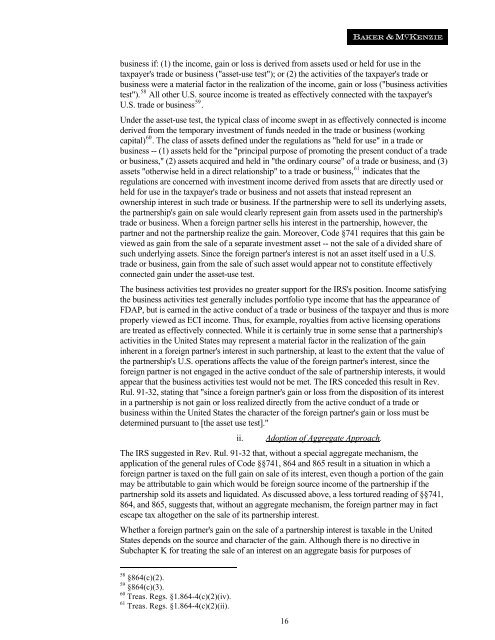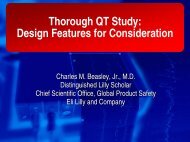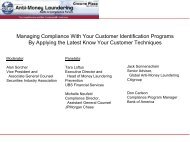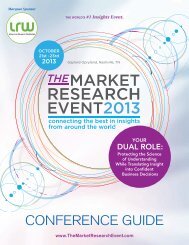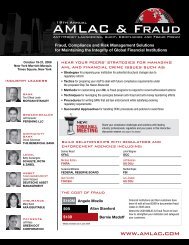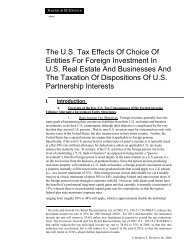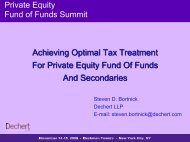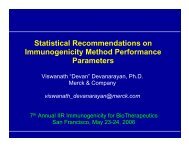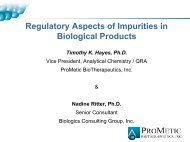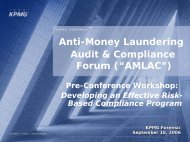The US Tax Effects Of Choice Of Entities For Foreign Investment - IIR
The US Tax Effects Of Choice Of Entities For Foreign Investment - IIR
The US Tax Effects Of Choice Of Entities For Foreign Investment - IIR
Create successful ePaper yourself
Turn your PDF publications into a flip-book with our unique Google optimized e-Paper software.
usiness if: (1) the income, gain or loss is derived from assets used or held for use in the<br />
taxpayer's trade or business ("asset-use test"); or (2) the activities of the taxpayer's trade or<br />
business were a material factor in the realization of the income, gain or loss ("business activities<br />
test"). 58 All other U.S. source income is treated as effectively connected with the taxpayer's<br />
U.S. trade or business 59 .<br />
Under the asset-use test, the typical class of income swept in as effectively connected is income<br />
derived from the temporary investment of funds needed in the trade or business (working<br />
capital) 60 . <strong>The</strong> class of assets defined under the regulations as "held for use" in a trade or<br />
business -- (1) assets held for the "principal purpose of promoting the present conduct of a trade<br />
or business," (2) assets acquired and held in "the ordinary course" of a trade or business, and (3)<br />
assets "otherwise held in a direct relationship" to a trade or business, 61 indicates that the<br />
regulations are concerned with investment income derived from assets that are directly used or<br />
held for use in the taxpayer's trade or business and not assets that instead represent an<br />
ownership interest in such trade or business. If the partnership were to sell its underlying assets,<br />
the partnership's gain on sale would clearly represent gain from assets used in the partnership's<br />
trade or business. When a foreign partner sells his interest in the partnership, however, the<br />
partner and not the partnership realize the gain. Moreover, Code §741 requires that this gain be<br />
viewed as gain from the sale of a separate investment asset -- not the sale of a divided share of<br />
such underlying assets. Since the foreign partner's interest is not an asset itself used in a U.S.<br />
trade or business, gain from the sale of such asset would appear not to constitute effectively<br />
connected gain under the asset-use test.<br />
<strong>The</strong> business activities test provides no greater support for the IRS's position. Income satisfying<br />
the business activities test generally includes portfolio type income that has the appearance of<br />
FDAP, but is earned in the active conduct of a trade or business of the taxpayer and thus is more<br />
properly viewed as ECI income. Thus, for example, royalties from active licensing operations<br />
are treated as effectively connected. While it is certainly true in some sense that a partnership's<br />
activities in the United States may represent a material factor in the realization of the gain<br />
inherent in a foreign partner's interest in such partnership, at least to the extent that the value of<br />
the partnership's U.S. operations affects the value of the foreign partner's interest, since the<br />
foreign partner is not engaged in the active conduct of the sale of partnership interests, it would<br />
appear that the business activities test would not be met. <strong>The</strong> IRS conceded this result in Rev.<br />
Rul. 91-32, stating that "since a foreign partner's gain or loss from the disposition of its interest<br />
in a partnership is not gain or loss realized directly from the active conduct of a trade or<br />
business within the United States the character of the foreign partner's gain or loss must be<br />
determined pursuant to [the asset use test]."<br />
ii.<br />
Adoption of Aggregate Approach.<br />
<strong>The</strong> IRS suggested in Rev. Rul. 91-32 that, without a special aggregate mechanism, the<br />
application of the general rules of Code §§741, 864 and 865 result in a situation in which a<br />
foreign partner is taxed on the full gain on sale of its interest, even though a portion of the gain<br />
may be attributable to gain which would be foreign source income of the partnership if the<br />
partnership sold its assets and liquidated. As discussed above, a less tortured reading of §§741,<br />
864, and 865, suggests that, without an aggregate mechanism, the foreign partner may in fact<br />
escape tax altogether on the sale of its partnership interest.<br />
Whether a foreign partner's gain on the sale of a partnership interest is taxable in the United<br />
States depends on the source and character of the gain. Although there is no directive in<br />
Subchapter K for treating the sale of an interest on an aggregate basis for purposes of<br />
58 §864(c)(2).<br />
59 §864(c)(3).<br />
60 Treas. Regs. §1.864-4(c)(2)(iv).<br />
61 Treas. Regs. §1.864-4(c)(2)(ii).<br />
16


